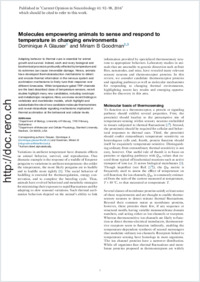Molecules empowering animals to sense and respond to temperature in changing environments
- Glauser, Dominique A. Department of Biology, University of Fribourg, Switzerland
- Goodman, Miriam B. Department of Molecular and Cellular Physiology, Stanford University, Stanford, USA
-
19.09.2016
Published in:
- Current Opinion in Neurobiology. - 2016, vol. 41, p. 92–98
English
Adapting behavior to thermal cues is essential for animal growth and survival. Indeed, each and every biological and biochemical process is profoundly affected by temperature and its extremes can cause irreversible damage. Hence, animals have developed thermotransduction mechanisms to detect and encode thermal information in the nervous system and acclimation mechanisms to finely tune their response over different timescales. While temperature-gated TRP channels are the best described class of temperature sensors, recent studies highlight many new candidates, including ionotropic and metabotropic receptors. Here, we review recent findings in vertebrate and invertebrate models, which highlight and substantiate the role of new candidate molecular thermometers and reveal intracellular signaling mechanisms implicated in thermal acclimation at the behavioral and cellular levels.
- Faculty
- Faculté des sciences et de médecine
- Department
- Département de Biologie
- Language
-
- English
- Classification
- Biological sciences
- License
- License undefined
- Identifiers
-
- RERO DOC 278410
- DOI 10.1016/j.conb.2016.09.006
- Persistent URL
- https://folia.unifr.ch/unifr/documents/305317
Statistics
Document views: 35
File downloads:
- gla_mea.pdf: 190
